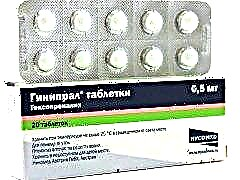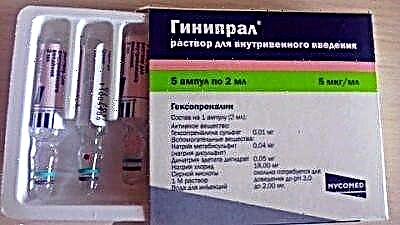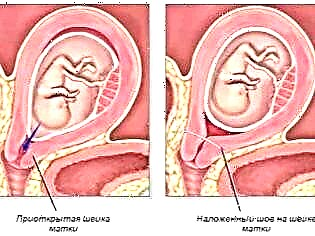
If a pregnant woman has an increase in the tone of the uterus or contractions begin, but the due date has not yet arrived, this condition must be treated immediately to prevent early birth or miscarriage. In many cases, with timely access to doctors, dangerous consequences can be avoided. One of the drugs that is used in such situations is Ginipral.
It has been used for many years in obstetric practice to maintain pregnancy and terminate labor, if the time for the birth of a baby has not yet come. The medication is considered relatively safe for the fetus, but it can have a negative effect on the mother's body and has a rather impressive list of contraindications.
Features of the drug
"Ginipral" is presented in pharmacies only in the form of a solution, which is administered intravenously. This medicine is a colorless transparent liquid, poured into sterile 2 ml ampoules. One package contains 5 or 25 ampoules.
The active substance of the medication is hexoprenaline sulfate. The dosage of such an ingredient in one ampoule is 0.01 mg. Additionally, the solution contains disodium edetate, sodium disulfite, sodium chloride, water and sulfuric acid.
Before the acquisition of "Giniprala" a doctor's consultation is required, because this is one of prescription drugs. The average price of 5 ampoules is 250 rubles. Storage of the medication should be carried out at temperatures up to +25 degrees. The shelf life of the solution is 3 years.
Note that earlier "Ginipral" could also be found in tablets, but at the present time this form was banned and stopped producing, leaving only injectable medicine in circulation.

Operating principle
Since the active substance contained in "Ginipral" is capable of acting on adrenergic receptors, the drug belongs to the group of adrenergic agonists. It is called selective because the drug only affects a specific type of receptor called beta-2. Since in a woman's body they are concentrated in large quantities in the uterus, the therapeutic effect of the injections is directed primarily to the smooth muscles of this organ. Such receptors are also found in the bronchi and blood vessels, therefore as a result of the action of "Ginipral", the smooth muscles of the vessels and bronchi relaxes, which causes their expansion.
Injected into a vein, "Ginipral" very quickly reduces the tone of the uterus. Under the action of such a medicine, contractions become less intense and frequent, which is used for irregular or too strong contractions. In addition, the drug is able to completely stop contractions if labor begins early. Due to the effect on the vessels of the uterus and the tone of the muscular membrane Ginipral also improves blood flow in the placenta.

Is it allowed during pregnancy?
"Ginipral" is prescribed to expectant mothers if the gestation period is more than 22 weeks. The use of the drug in the first trimester is contraindicated, even if the woman has symptoms of threatened abortion. In such a situation, the doctor prescribes another medication that can be used early, for example, "Duphaston". If the gestational age has exceeded 22 obstetric weeks, the use of "Ginipral" is possible only with strict indications, when the doctor carefully assessed the risks and benefits of such treatment.
The drug is administered only in medical institutions since the condition of the expectant mother and fetus during injections should be monitored with special equipment.
To exclude the harmful effect of "Ginipral" on the health of women and babies, it is important to constantly monitor the indicators of pulse and blood pressure, the concentration of glucose and potassium, as well as the balance of water and electrolytes. In addition, in order to prevent the negative effect of the medication on the heart, the woman will definitely have an ECG.

When is it prescribed for expectant mothers?
The reason for using "Ginipral" in women in the 2nd and 3rd trimesters is the following situations:
- if the cervix begins to open or flatten, but the gestational age is still too small for delivery;
- if during childbirth the child has so-called distress caused by acute hypoxia or asphyxia;
- if the expectant mother needs to be prepared for a cesarean section and she has an increased uterine tone;
- if labor is complicated, for example, the child is lying incorrectly, the uterus contracts too much or for a very long time (the course of labor has been delayed);
- if it is required to correct the position of the fetus with an external rotation;
- if a woman starts giving birth ahead of time and there is a risk that she will not get to the hospital on time;
- if the patient was given a cerclage, a special suture on the cervix, which prevents its premature disclosure.


Contraindications
For the use of "Giniprala" in pregnant women, in addition to a period of less than 22 weeks, there are other restrictions:
- the drug is not prescribed for hypersensitivity to any of its ingredients, be it hexoprenaline or any inactive component;
- the drug is not administered if the membranes have ruptured, as well as in cases where the cervix has opened by more than 3-4 centimeters;
- the medication is contraindicated in women with ischemic disease or a high risk of developing it;
- injections are not prescribed for hypersensitivity to sulfites, which is often found in bronchial asthma;
- treatment with "Ginipral" is inappropriate if pregnancy support poses a danger to the fetus or woman, for example, with eclampsia, placental abruption or intrauterine infection of the child;
- the drug is not used if the fetus died in utero, including in chromosomal diseases and other lethal pathologies;
- injections are prohibited for women with thyrotoxicosis, angle-closure glaucoma, serious kidney or liver pathologies;
- "Ginipral" should not be injected with myocarditis, mitral valve damage, arrhythmias and many other cardiovascular diseases;
- the medicine can harm patients with cardiomyopathies or pulmonary hypertension.
In addition, in the annotation to the solution, quite a lot of health problems were noted, when the use of "Ginipral" requires increased caution. These include intestinal atony, low blood pressure, diabetes mellitus and some other pathological conditions.

It is especially important to monitor the administration of the medication if a woman has a risk of pulmonary edema, which is noted in multiple pregnancies, preeclampsia in late stages and infections.
Side effects
Since the drug has a pronounced beta-2 selectivity, the effect of injections on the work of the heart, in theory, should be insignificant, as mentioned in the paper annotation to the ampoules. However, during treatment with "Ginipral", the following side effects are possible:
- increased heart rate;
- headache;
- drop in potassium levels in the blood;
- muscle twitching;
- feeling of palpitations;
- lowering blood pressure;
- nausea;
- decrease in peristalsis and intestinal tone;
- increased sweating.


When they appear, the doctor decides on the further use of the drug, reducing the dosage, prescribing additional medications (for example, "Verapamil") or replacing the drug with an analogue. In rare cases, the remedy also affects the child, for example, it causes bronchospasm, hypoglycemia, or a serious allergic reaction in the newborn.
If you exceed the dosage of the drug, arrhythmias, heart pain, anxiety, muscle tremors, hypotension, shortness of breath and other symptoms may occur. To eliminate an overdose, adrenergic blockers that act on beta receptors are usually prescribed. Such drugs are able to neutralize all the effects of "Ginipral", but if the patient has bronchial asthma, they can lead to bronchospasm.

How to apply?
As already mentioned, "Ginipral" is used in medical institutions, and a qualified nurse or doctor should inject the medication. The solution is injected only into a vein or jet, but very slowly (the entire dosage should enter the bloodstream in 5-10 minutes), or drip. The ampoule is opened along the line marked on it, after which the health worker puts a dropper or performs an injection, having previously diluted Ginipral with an isotonic sodium chloride solution.
According to instructions, the dosage of the medication should be individual, because it depends on the reason for the appointment of injections, and on the condition of the woman... Sometimes, immediately after hospitalization, the solution is injected slowly in a stream, and then the system is connected, dissolving the amount of the medicine prescribed by the doctor in 500 ml of the infusion solution. The rate at which the drug enters the bloodstream (drops per minute) is determined based on the required dosage (number of ampoules).
The withdrawal of the drug is carried out gradually to prevent the return of dangerous symptoms.


Reviews
In most reviews about "Ginipral", which leave women in position, the medicine is called effective and fulfilling the task of eliminating the tone of the uterus when it is necessary to stop contractions. Pregnant women who have had a chance to be treated with such a remedy confirm that the injections helped to maintain the pregnancy and bring the baby to a safe time without any problems.
The main disadvantage of the drug is considered its side effects. In some women, the drug provoked tachycardia, in others - a feeling of heat, trembling in the hands, tinnitus, and in others it had a negative effect on the fetus. In addition, the form of release is also referred to the disadvantages of the drug. Many expectant mothers note that it was much more convenient to take pills when they were still produced. Besides, as a rule, droppers with "Ginipral" are rather long in time.
According to women and doctors, This is an effective tool that allows you to successfully deliver a pregnancy, but it cannot be called safe, because it has a large list of contraindications, and the condition of the expectant mother during treatment must be monitored by medical personnel. However, in situations where its use is indispensable, "Ginipral" has proved to be a good side.

Analogs
Drugs that contain the same active substance that is in "Ginipral" are not produced, therefore, if it is necessary to replace this medication with other drugs, doctors choose drugs with similar therapeutic effects. These include the following drugs.
- "Utrozhestan". Such capsules containing progesterone can be used at any gestation period. They are not contraindicated in the 1st trimester and can be prescribed even before conception. At a later date, the drug is in demand for cervical insufficiency and low levels of natural progesterone. They are used for too early softening and shortening of the cervix at 30-37 weeks. In this case, the capsules can be either swallowed or inserted into the vagina like suppositories.
- "Traktocil". This atosiban-based drug acts on receptors that are sensitive to oxytocin, so it effectively reduces the frequency of contractions and reduces the tone of the myometrium, but does not affect the heart in any way. Infusions of this drug are indicated for regular uterine contractions and cervical dilatation up to 3 cm at 24-33 weeks of gestation. The agent is contraindicated in cases of fetal heart rate disorders, severe gestosis, intrauterine infection and placental abruption. It has fewer side effects, but is more expensive than other tocolytics.
- "No-shpa". This drotaverine-based medicine is presented by injections and tablets. It works on smooth muscles to relax them. In the first and second trimesters, "No-shpu" is prescribed for hypertonicity, however, from the 26th week, such a drug is used with caution, since it can unnecessarily relax the cervix and provoke the onset of labor prematurely. The use of "No-shpy" during childbirth helps to normalize labor activity if the contractions are uneven or other complications have arisen.
- "Nifedipine"... Such a medication in capsules and tablets is able to block calcium channels, as a result of which the smooth muscle membranes relax. It is more often used for angina pectoris and hypertensive crises, but it can also be prescribed to expectant mothers whose childbirth began prematurely. The drug is used with increased caution, as it can adversely affect the fetus.
- "Magnesium sulfate". Injections of such a drug relax smooth muscles, affect the functioning of the nervous system, dilate arteries, and soothe. The drug is allowed during pregnancy only in serious cases and is used with caution. Usually magnesium is prescribed for the threat of premature birth, as well as expectant mothers with late gestosis. Recently, this medicine has been used less and less, replacing it with safer drugs.



